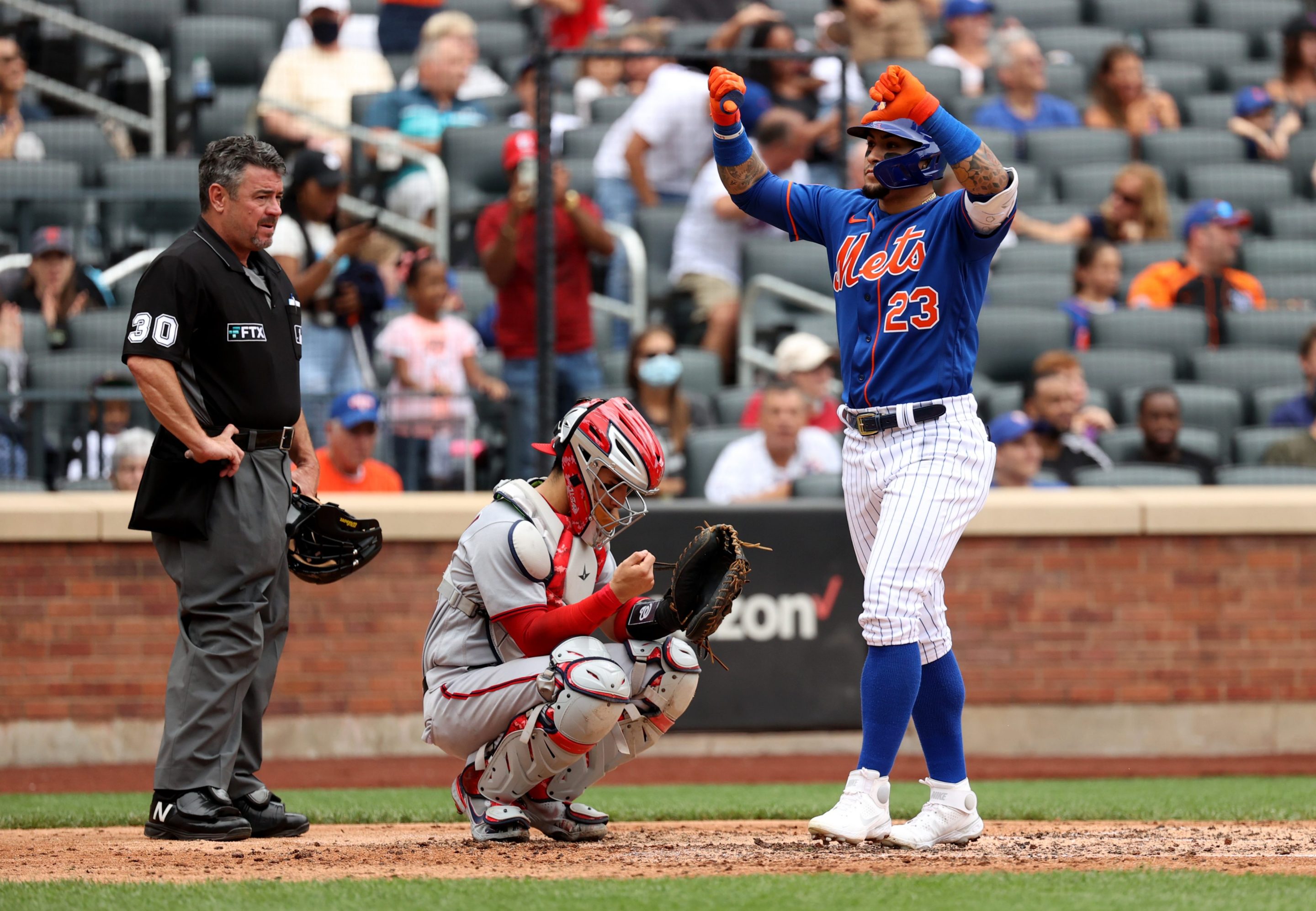The Mets found themselves in a strange position at July's MLB trade deadline, which is not entirely an oblique way of saying that they were in first place. They were also in first place, as it happened, three-and-a-half games ahead of the second-place Phillies and four up on the Braves. But the strangeness only started there. By just about every underlying metric, those first-place Mets weren't really all that good.
The starting pitching had been solid despite the team's trademark inability to effectively rehabilitate any injury, although Jacob deGrom's historic season had become stuck in a distinctly Metsian ambiguity—medical scans and fraught side sessions and setbacks that no one involved with the team ever dared describe as setbacks, all of it suggesting an injury that was being heatedly and unconvincingly denied for reasons that were very hard to parse even by the team's usual standard for weird useless lies. The bullpen had been rather shockingly great, but was already fraying around the edges under the strain of intense overuse.
The offense was by any measure quite bad, although there was reason to believe it would get better given that the lineup was full of young-to-youngish former all-stars, almost all of whom had, at the same time, abruptly and mostly inexplicably started hitting like Drew Butera. Some of them were playing hurt, because that is a thing the Mets consider something of a legacy organizational value, and cornerstone shortstop Francisco Lindor was among a handful of contributors then too hurt to play, but there was still no real reason why the Mets couldn't have won their underachieving division. There was also no real reason why a team as janky as they were should have been in first place in the first place. The team was confounding, and institutionally embarrassing in the way that the Mets have been for a very long time now, but they were winning, and teams like that—imperfect collections of red-ass weirdos and vagabonds and under- and overachievers and a few actual stars—can and do win their divisions every year.
In 2015, a Mets team like that won the damn pennant, thanks in large part to deadline acquisition Yoenis Céspedes spending a crucial month as a vengeful offensive deity. That deal, like the one that the Mets wound up making at the deadline for the electric and baffling Cubs shortstop Javy Báez, was both bold and something of a half-measure—the Mets gave up one of their best offensive prospects in return, and the Cubs paid Báez's salary through the end of this season, at which point he would become a free agent. The Mets were by all accounts adamant about not adding to the payroll at the deadline, and so wound up making a deal that kept open the possibility of a 2015-style dream season—Báez is absolutely the sort of star who could become an avenging godhead for three or four decisive weeks—without actually increasing the likelihood of that outcome. If it worked, as it might very well have worked, that would be super. If it didn't, it wouldn't have cost the team anything but, uh, its best outfield prospect. All the people within the organization whose jobs depend seemingly entirely upon projecting a grouchy sort of trying could point grouchily to the trade as proof that they had more or less tried. The absence of MLB's second, later, waiver-specific trade deadline meant that no additional fine-tuning moves would be possible; the determination not to add payroll, even at minimal trade cost, guaranteed that Báez would represent the team's sole significant roll of the dice.
On Sunday, Báez delivered a performance that was perfectly characteristic of his time with the Mets, and of the broader Javy Báez experience—he struck out twice on wild and vicious swings at pitches that were not really anywhere near the strike zone, lined out to short, and also hit an awe-inspiring 444-foot homer into the second deck so loud and mean that the pitcher started making Tim Robinson faces the moment the ball left Báez's bat. It gave the Mets a lead that they would not relinquish, and they won for the fourth time in their last 16 games. A thought that I have kept coming back to after Báez revealed after the game that the team's new thumbs-down celebration was designed to spite the home fans that have booed them during an abject collapse that has left the team seven-and-a-half games back in the NL East, and then after the team issued a huffy statement effectively taking the side of those booing fans, is that the trade deadline was just one month ago.
Javy Báez said the Mets' new thumbs down celebration is a response to fans booing the team.
— Deesha (@DeeshaThosar) August 29, 2021
"We're not machines, we're going to struggle. ... It just feels bad when I strikeout and I get booed. ... We're going to do the same thing to let them know how it feels," he said. pic.twitter.com/CYkHVpE2KH
The New York Mets just put out a statement in which the team president said it's OK for fans to boo, it's not OK for players to mock their fans for booing and there's going to be a team meeting to address this. pic.twitter.com/xWNj3NFoBu
— Jeff Passan (@JeffPassan) August 30, 2021
The first thing you will notice about this story, both in its variously unappealing particulars and its broader lousy vibes, is that it just completely sucks ass. The response to it thus far has been a dispiriting combination of ecstatic sanctimony—here is the sunburnt Midwestern bon vivant who owns the Indianapolis Colts demanding that somebody think of the children—and stagey faux-expertise. The team's beat reporters identified other players on the team that have engaged in the thumbs-down celebration, and each of those .673 OPS duffers will presumably have to issue strained apologies at some point before the Mets play their next game on Tuesday. The celebration, hilariously, seems to date back at least to early August, although the team has had so few opportunities to celebrate since then that no one really noticed it until Sunday's laugher inspired Baez to snitch on himself.
It won't matter very much or for very long, because it is highly unlikely that the Mets will play much of a role in the last and most meaningful stretch of the season, but for now it is all being treated as something very serious indeed. As a general rule, the Mets are covered in local media the same way that tabloid hate objects like Lindsay Lohan were covered a decade and a half ago, which is to say as objects of derisive obsession and with a sort of giddy prurient sadism that poses as principled concern. It fits much better than it should, given how relentlessly and zealously and haplessly public the Mets have been in their sloppiness and pettiness.
This latest bit aside, the players have very little to do with this on balance. They are the (limping, undermined) labor and the (expensive, unsatisfying) product, but also seem more or less incidental to the broader enterprise, which is mostly about the refracted and projected misery of everyone that associates themselves with the team, be they the people in the seats booing or the mutants lobbing N-slurs at Marcus Stroman's social media accounts or the distressingly epic owner wondering on Twitter whether anyone on the team had considered improving their OPS.
As a baseball team, the Mets will almost certainly not mean much this year. As the thing they are instead—an expensive public edifice that somehow defaces itself, an office whose little shitty feuds are somehow everyone's business and everywhere, a howling metonym for a specific type of self-chosen misery—they are much more useful. Something would inarguably be lost if the Mets somehow became less like the Mets and more like every or any other baseball team, and while I as a Mets fan would not personally miss it much, there's no disputing the reality of the service the team provides as a sort of public avatar of shamelessness. What is striking about it all is not just that absolutely no one is happy, here, although there is that. It's the extent to which everyone involved seems, actively or passively, to have accepted that being unhappy is something like the point.
Thankfully, though, there is a compromise before us, and maybe a solution. To punish these vile fans, to spite the cynical ownership and sourly mediocre executives, to hush up the ravening tabloid jackals who want them to fail, the Mets should just continue to win baseball games. They'd hate that. Everyone involved seems to hate everything about all of this, which admittedly mitigates the impact somewhat, but it seems worth a try all the same.






